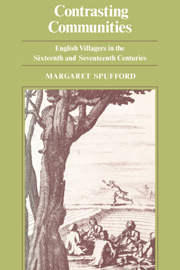Book contents
- Frontmatter
- Contents
- List of maps and graphs
- List of tables
- List of abbreviations
- Acknowledgements
- Dedication
- Introduction
- Map 1 Cambridgeshire: natural boundaries and soil types
- Map 2 Cambridgeshire: county and parish boundaries
- PART 1 People, Families and Land
- PART 2 The Schooling of the Peasantry
- 6 A general view of schools and schoolmasters
- 7 The elementary ability to write: Willingham and Orwell
- 8 The importance of reading in the village community
- PART 3 Parishioners and their Religion
- Conclusion
- Appendix 1 The Butlers of Orwell
- Appendix 2 Notes on Graphs 3 and 5
- Index of Contemporary Names
- General Index
6 - A general view of schools and schoolmasters
Published online by Cambridge University Press: 25 January 2010
- Frontmatter
- Contents
- List of maps and graphs
- List of tables
- List of abbreviations
- Acknowledgements
- Dedication
- Introduction
- Map 1 Cambridgeshire: natural boundaries and soil types
- Map 2 Cambridgeshire: county and parish boundaries
- PART 1 People, Families and Land
- PART 2 The Schooling of the Peasantry
- 6 A general view of schools and schoolmasters
- 7 The elementary ability to write: Willingham and Orwell
- 8 The importance of reading in the village community
- PART 3 Parishioners and their Religion
- Conclusion
- Appendix 1 The Butlers of Orwell
- Appendix 2 Notes on Graphs 3 and 5
- Index of Contemporary Names
- General Index
Summary
If we turn from the economic setting in which a village community lived, to attempt the much more difficult task of gaining some impression of the importance which religion and doctrinal thought had within such a community, we are at once faced with the question of the degree of education available to men and women below gentle status. It seems necessary to establish this before moving on to the fragmentary evidence which bears on belief at village level. If the man behind the plough could read, he was at once exposed to the propagandist religious literature which was pouring off the printing presses in the sixteenth century. He was no longer totally influenced by the opinions of his parish priest or minister, who, in turn, was no doubt influenced and controlled by the patron of his benefice. Instead, if a rudimentary education was available to the village, and if he had any leisure, he at once became free, or at least freer, of the whole world of religious dispute and conviction which made up so much of sixteenthand seventeenth-century life and politics.
Here again, though, there is an economic link. The growth of a demand for education demands prosperity, which can enable families to spare children from the labour force. Great emphasis has been placed on the increasing prosperity of the farming classes during the sixteenth century, and the expression of this in a higher standard of living, shown in the proliferation of domestic offices in farmhouses.
- Type
- Chapter
- Information
- Contrasting CommunitiesEnglish Villages in the Sixteenth and Seventeenth Centuries, pp. 171 - 191Publisher: Cambridge University PressPrint publication year: 1974



